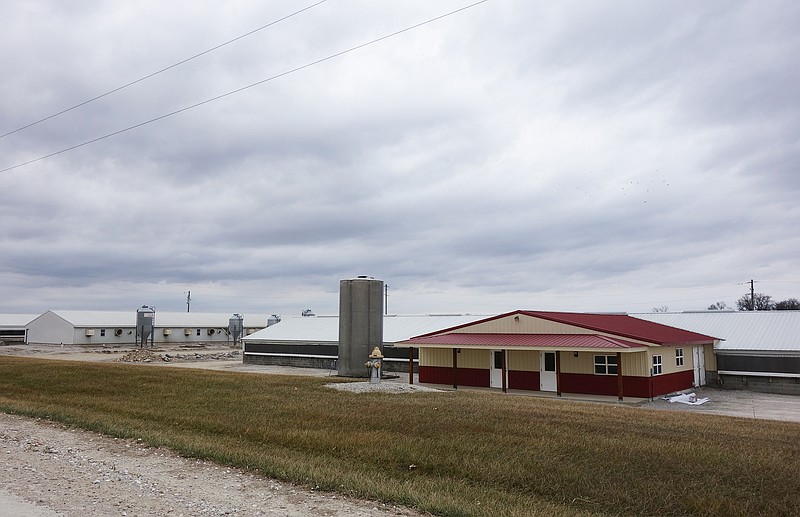A Callaway County farmer was recently found to be running an unlicensed concentrated animal feeding operation, according to a Missouri Department of Natural Resources report.
Rich Fohey operates Rich Fohey Farms, which despite its Columbia address, sits on the Callaway County side of Cedar Creek. According to a letter of warning from the DNR dated Nov. 7, an October investigation found his farming operation involved enough sows to qualify as a Class 1C CAFO but lacked a proper permit.
"In my experience, it doesn't happen that often," said Jamie Shinn, environmental supervisor at the DNR's Northeast Regional Office.
Fohey said his farrowing operation goes back to 1990 and only this year "inched up over the threshold" to qualify as a Class 1C CAFO. He said they simply hadn't gotten around to filing the paperwork for the permit.
According to the inspection report, the DNR received an "environmental concern" pointing out the facility appeared to be larger than a Class 2 Animal Feeding Operation (which does not require a permit) and was not listed on the DNR's CAFO map (bit.ly/2QBpdSS). Shinn said the DNR does not disclose the source of concern reports. The farm has not previously been subjected to an investigation or inspection.
"We'd never had an issue with the DNR," Fohey said.
Michael Heaton, an environmental scientist with the DNR, led the investigation. Based on Google Earth data, Heaton wrote in his report, the facility consists of two lagoons and several production buildings. One lagoon predates Google Earth's imaging, while the other was built around 2005.
Heaton reached out to Fohey on Oct. 9 over the phone and explained the DNR's concerns.
"Fohey stated that they have worked up over that number and recently added another farrowing building," Heaton wrote. "I asked Mr. Fohey how many animals he has in the facility. Mr. Fohey stated that he now has 2,700-2,800 sows in the farrowing facility."
Heaton said any animal feeding operating facility with more than 1,000 animal units (that is, 2,500 swine weighing at least 55 pounds) is classed as a CAFO and requires a permit. He told Fohey acquiring a Class 1C CAFO permit will require conforming to certain setback distances (which limit how close a CAFO can be to residences, schools, etc.).
Heaton noted Fohey said "he thought he could meet the setback distances."
"I explained that if a permit could not be obtained, they would have to reduce animals in the facility below 1,000 animal units," Heaton added.
The DNR sent Fohey a letter of warning informing him operating a Class 1 CAFO without a permit is "a violation of Missouri Clean Water Law Section 644.051.2 and 644.076.1, RSMo and Missouri Clean Water Commission Regulation 10 CSR 20-6.300(2)(B)."
Additionally, Fohey may have violated regulations by failing to acquire a construction permit before constructing the second lagoon.
"If it is determined that a construction permit was required, additional violations may be cited in the future," the report noted. Shinn said determination has not yet been made; a DNR office in Jefferson City is looking into it.
Fohey was ordered to acquire the services of a certified engineer and submit a CAFO Operating Permit Application (including neighbor notices) to the department. He was given until Thursday to do so.
"They are in the process of submitting the required paperwork and the obtaining permit," Shinn said. "That wasn't possible within 60-day time frame. We're allowing them more time because of the amount of paperwork."
Fohey said he's hired an engineer and "a guy who handles permit stuff." His goal is to turn in all required paperwork by March 1.
"We're in the works of getting all that done," he said. "I guess I don't see a big problem."
The DNR's focus is on Fohey's continued cooperation with the DNR to bring the farm into compliance with regulations, Shinn said.
"We'll go through the process," Shinn added. "As long as they voluntarily comply with the actions they're asking - that's our desire."

